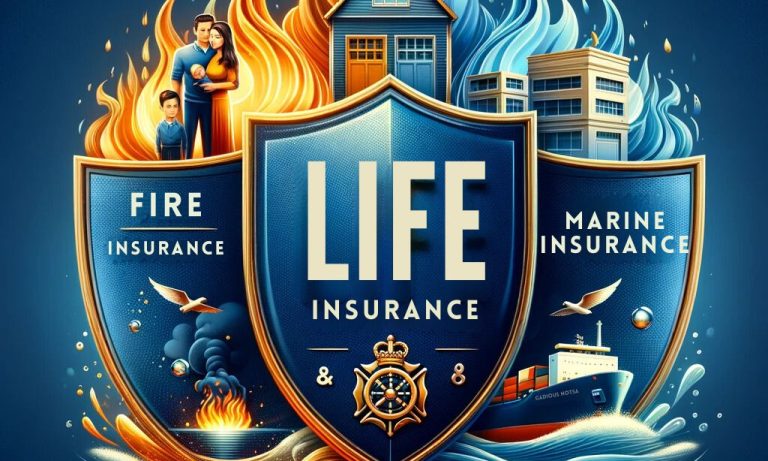Understanding the difference between life, fire, and marine insurance is essential for anyone looking to secure financial protection. These are the types of insurance, designed to provide coverage for various kinds of risks and events that have different forms of protection both for individuals and businesses. Life insurance protects people from death, fire insurance provides property against loss or damage from fire, and marine insurance offers protection against shipping risks. Each will be discussed in depth along with the differences between these.
What is Life Insurance?
Life insurance is a contract between the policyholder and the insurer, where the insurer agrees to provide a financial payout to the policyholder’s beneficiaries upon the policyholder’s death. The policyholder pays regular premiums, and in exchange, the insurer guarantees that the beneficiaries will receive a death benefit. Life insurance is primarily designed to provide financial security to loved ones in case of the policyholder’s untimely death.
Life insurance serves as a financial safety net for families, ensuring that they are not left financially vulnerable in the event of the policyholder’s death. It can cover living expenses, debts, and future needs like education.
What is Fire Insurance?
Fire insurance is a type of property insurance that covers financial losses caused by fire damage to property. This insurance protects buildings, homes, and other properties against the risk of fire and related hazards such as smoke damage, explosions, and water damage caused by firefighting efforts. The purpose of fire insurance is to reimburse the policyholder for the costs associated with rebuilding or repairing the property after a fire.
Fire insurance is crucial for homeowners and businesses alike, offering peace of mind by protecting valuable assets from fire-related risks. However, it typically does not cover damage caused by other perils like flooding or earthquakes unless specified in the policy.
What is Marine Insurance?
Marine insurance is a specialized form of insurance that covers the loss or damage of goods, cargo, ships, and other marine vessels during transit. It also extends to cover the risk of piracy, natural disasters, or accidents that may occur while transporting goods by sea, air, or land. Marine insurance helps protect businesses involved in shipping and international trade from the financial consequences of shipping disruptions.
Marine insurance is essential for businesses that rely on international shipping, ensuring that their goods are protected from potential losses due to shipping accidents or natural disasters.
Difference Between Life, Fire, and Marine Insurance
Understanding the difference between life, fire, and marine insurance is crucial when choosing the right type of coverage. Below are five key differences between these types of insurance:
Purpose of Insurance
- Life Insurance: Life insurance helps protect your family financially if you pass away. It ensures that your loved ones can cover expenses like bills, mortgages, and other daily costs without your income.
- Fire Insurance: Fire insurance protects your property from damage caused by fire. If a fire destroys or damages your home or business, the insurance helps pay for repairs or replacement.
- Marine Insurance: Marine insurance covers goods and cargo during transportation. It protects against damage or loss caused by accidents, piracy, or bad weather while the goods are in transit.
Risks Covered
- Life Insurance: Life insurance covers the risk of death. It helps your family manage financially if you unexpectedly pass away.
- Fire Insurance: Fire insurance covers damage caused by fire, including smoke and explosions. It helps repair or replace property that gets damaged in a fire.
- Marine Insurance: Marine insurance protects against risks during transportation, like accidents, piracy, and natural disasters. It ensures goods are covered if they get damaged or lost during transit.
Beneficiary
- Life Insurance: The beneficiary of a life insurance policy is usually a family member or loved one. They receive the payout to help with financial needs after the policyholder’s death.
- Fire Insurance: The beneficiary is typically the property owner or business. They receive the payout to repair or rebuild the damaged property.
- Marine Insurance: The beneficiary is usually the owner of the cargo or the shipping company. They get the payout if the cargo or vessel is damaged during transport.
Premium Calculation
- Life Insurance: Life insurance premiums depend on the policyholder’s age, health, and coverage amount. Younger and healthier people pay lower premiums.
- Fire Insurance: Fire insurance premiums are based on the value of the property and the level of fire risk. Higher-value properties or areas with more fire risk lead to higher premiums.
- Marine Insurance: Marine insurance premiums depend on the value of the cargo, the type of transport, and the risks involved. Riskier voyages or more valuable goods increase the premium.
Duration of Coverage
- Life Insurance: Life insurance can be for a set period (term insurance) or your lifetime (whole life insurance). Term insurance lasts for a fixed number of years, while whole life insurance covers you for life.
- Fire Insurance: Fire insurance usually lasts for one year and can be renewed annually. The policy must be renewed each year to maintain coverage.
- Marine Insurance: Marine insurance covers the duration of a specific voyage. Once the goods reach their destination, the coverage ends, unless renewed for another trip.
| Aspect | Life Insurance | Fire Insurance | Marine Insurance |
| Purpose | Protects family financially if you pass away. | Protects property from fire damage. | Covers goods and cargo during transportation. |
| Risks Covered | Risk of death, ensuring your family is financially secure. | Fire, smoke, and explosions that damage property. | Accidents, piracy, and natural disasters during transit. |
| Beneficiary | Family members or loved ones receive the payout. | The property owner or business receives the payout. | The cargo owner or shipping company receives the payout. |
| Premium Calculation | Based on age, health, and coverage amount. | Based on property value and fire risk. | Based on cargo value, transport type, and voyage risks. |
| Duration of Coverage | Can be for a set term (years) or life. | Typically 1 year, renewable annually. | Covers the duration of a specific voyage. |
Conclusion
In conclusion, the difference between life, fire, and marine insurance lies in the specific risks they cover and the type of protection they offer. Life insurance provides financial security for your family in the event of your death, fire insurance protects your property from fire-related damages, and marine insurance safeguards your goods and cargo during transit. Each of these insurance types serves a unique purpose and is essential in ensuring financial security against different risks. Understanding these differences helps you make informed decisions about the types of insurance that best suit your needs.
Life, Fire & Marine Insurance FAQs
What is the difference between life insurance, fire insurance, and marine insurance?
Life insurance protects against the risk of death, fire insurance covers property damage caused by fire, and marine insurance covers goods and vessels during transit.
What is the purpose of life insurance?
The purpose of life insurance is to provide financial protection for the policyholder’s family or beneficiaries in case of the policyholder’s death.
How does fire insurance work?
Fire insurance protects property from damage caused by fire, smoke, explosions, and other related hazards. It reimburses the policyholder for repair or replacement costs.
What does marine insurance cover?
Marine insurance covers the loss or damage of goods, cargo, ships, and other vessels during transit, including risks like piracy, accidents, and natural disasters.
Can I have both fire insurance and marine insurance?
Yes, you can have both types of insurance. Fire insurance covers property from fire-related risks, while marine insurance protects goods and vessels during transportation.


